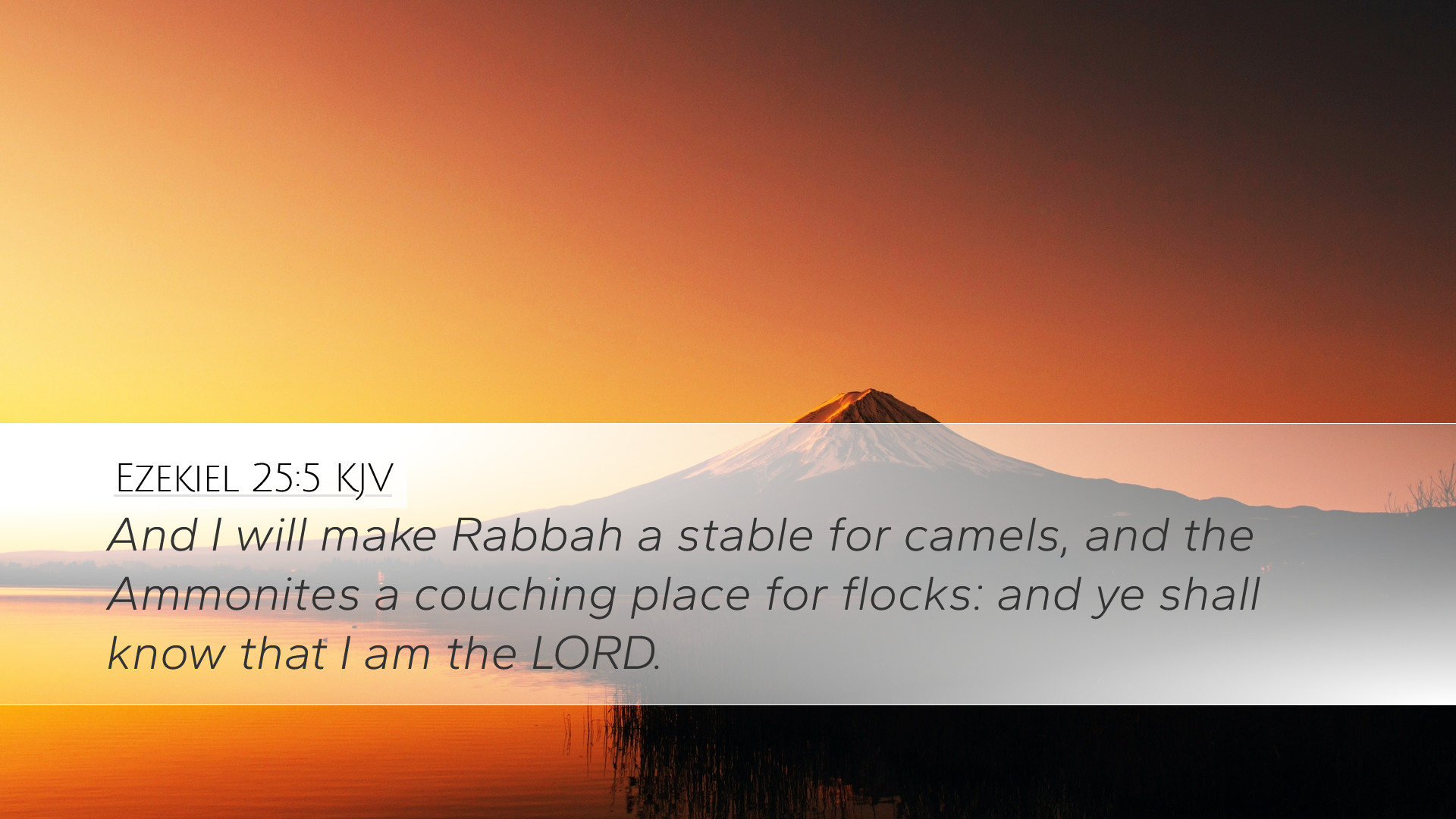Ezekiel 25:5 Commentary
Bible Verse: "And I will make Rabbah a stable for camels, and the daughter of the Ammonites a couching place for flocks: and ye shall know that I am the LORD." (Ezekiel 25:5)
Introduction
This verse is situated within a prophetic declaration against the Ammonites, illustrating God's judgment upon them due to their hostility toward Israel. The verse exemplifies a broader theme of divine sovereignty and the fulfillment of God's promises to His people. Understanding Ezekiel 25:5 requires us to delve into its historical context, theological implications, and its relevance for today's readers.
Historical Context
The Ammonites were descendants of Lot and had a long-standing enmity with Israel. Throughout the Old Testament, the Ammonites opposed Israel and even took delight in her misfortunes. The historical backdrop of Ezekiel's prophecy involves the Babylonian exile and the prophetic call for judgment against the nations surrounding Israel, particularly those that celebrated Israel's calamity.
Divine Judgment
Matthew Henry notes that God's declarations of judgment are not merely punitive; they are intended to reveal His sovereignty and righteousness. The imagery of Rabbah becoming a "stable for camels" illustrates that the city, once proud and significant, would be reduced to a mere site for beasts, emphasizing humiliation and desolation.
Albert Barnes elaborates that this transformation signifies the triumph of God's purposes over the arrogance of nations who defy Him. The Ammonites thought themselves secure in their pride and animosity against God's chosen people, yet they were destined to see their own downfall.
Thematic Insights
- God's Sovereignty: This verse underscores that God oversees the rise and fall of nations. He will not allow any nation to remain in opposition to His will. The phrase "ye shall know that I am the LORD" reveals that God's actions serve to establish His identity and authority in the world.
- Divine Retribution: The judgment pronounced against the Ammonites serves as a reminder that God is just, rewarding nations according to their actions towards His people. It reflects the biblical principle that those who curse Israel will themselves be cursed.
- Symbolism of Destruction: The conversion of Rabbah into a lodging place for livestock implies total devastation and loss of its former glory. The city, once a center of power, will become uninhabited and serve only as a shelter for animals.
Theological Implications
Adam Clarke emphasizes the broader theological narrative where God's justice can sometimes take temporal expression through destruction and desolation of nations. Clarke points out the metaphorical significance behind such transformations in the biblical text—indicating that God remains intimately involved in the affairs of nations and peoples.
This passage invites theologians and scholars to reflect on God's justice throughout history and the ethical implications of how nations treat one another, especially concerning their relationships with Israel. The anticipation of God's ultimate judgment mirrors the biblical beliefs regarding finality in history and the eventual establishment of justice, aligning with the eschatological themes found throughout the prophetic literature.
Contemporary Relevance
Ezekiel 25:5 resonates with modern audiences by challenging readers to consider how nations engage in conflict and rivalry, specifically in relation to God’s people. It serves as a cautionary message regarding the consequences of animosity and pride against those who are chosen by God.
The verse speaks to the present-day church regarding its role and mission in the world. It reminds believers that they are to be vessels through which God's character is displayed, and that they must not partake in the hostility that often characterizes human relationships.
Conclusion
The prophetic word delivered in Ezekiel 25:5 stands not only as a historical account of divine judgment upon the Ammonites but as a lasting reminder of God's sovereignty and justice in the world. It calls for deep introspection among pastors, students, and theologians about the relationship between God and the nations and emphasizes the prophetic witness the church is called to embody today.


